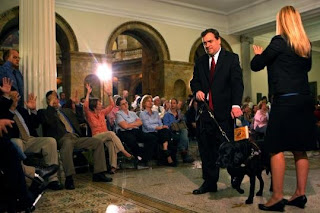 From The Boston Globe Sept. 30:
From The Boston Globe Sept. 30:When the man hired to make the State House accessible to disabled citizens began work, his first task was to fix his own office.
Carl Richardson, coordinator of disability access for the Bureau of State Office Buildings, had to install a small plastic ramp over a bump blocking access for wheelchairs into his office when he began working last year.
Governor Deval Patrick, Senate President Therese Murray, and House Speaker Salvatore F. DiMasi gathered advocates for the disabled together in the State House yesterday to highlight a series of improvements, most of them little fixes such as Richardson's office, that they say will make the State House accessible to all Massachusetts citizens.
The tens of thousands of dollars in improvements were spurred by a lawsuit against the state that alleged the State House did not comply with some requirements of the Americans with Disabilities Act. The lawsuit was filed in 2005 by the Disability Policy Consortium on behalf of four handicapped plaintiffs who complained that the State House had no method of ensuring hearing-impaired citizens could participate in legislative proceedings.
Bill Allen, executive director of the consortium, said among the barriers was a meeting on a bill related to hearing aids in which legislative staff did not supply sign-language interpreters. The meeting was postponed after advocates complained.
A budget meeting that dealt with funding for programs for hearing-disabled was also held without interpreters, he said. And in a third case, a door to a room providing access to a handicap-accessible viewing gallery was locked during a hearing.
When efforts to resolve the problems failed in 2005, the consortium decided to file its lawsuit, Allen said. The state settled the suit last year with the hiring of Richardson and other commitments to improve access.
"The Massachusetts State House right now is a model for the rest of the country," Allen said.Among the improvements made over the course of the past year are new power door lifts, closed-captioning for webcasts of legislative debates, and signlanguage interpreters available when requested for any proceedings. At the press conference, officials demonstrated screens that can be placed in meeting rooms and that can display the text of a speaker's words in real-time.
In addition to Richardson's office, several other offices had thresholds that impeded access for wheelchair-users, which have been outfitted with small ramps. The Bureau of State Office Buildings has installed power assisted doors throughout the State House, has printed training materials and conducted training for legislative staff, and has installed ATMs with Braille.Richardson said other improvements are being planned, with a $239,000 annual budget the Legislature has put in place for improving accessibility.
"We're looking to make the artwork accessible for the blind, through audio descriptions," said Richardson, who is blind and hard-of-hearing. "The areas we highlighted today were quick fixes we could do right away."
Patrick, DiMasi, and Murray in separate remarks said ensuring full access to the State House for the disabled was an key part of making sure the site lived up to its responsibility to serve as the people's house.
"American democracy only works when all have an opportunity to participate," Patrick said. "And that has to as a practical matter include the ability to get access to this building physically and to the business of this building through communication."

